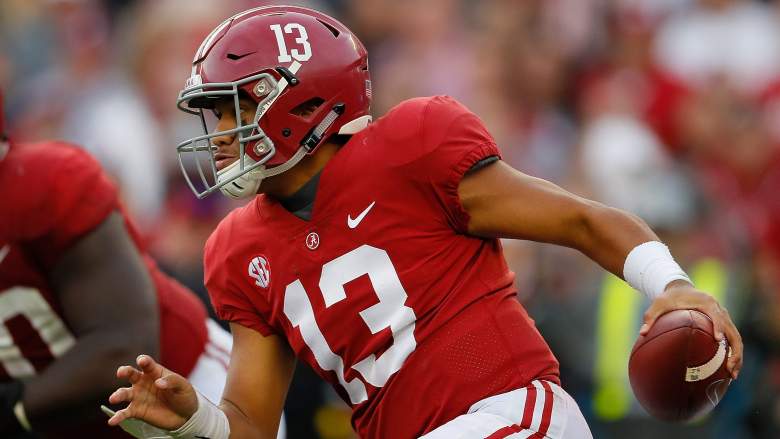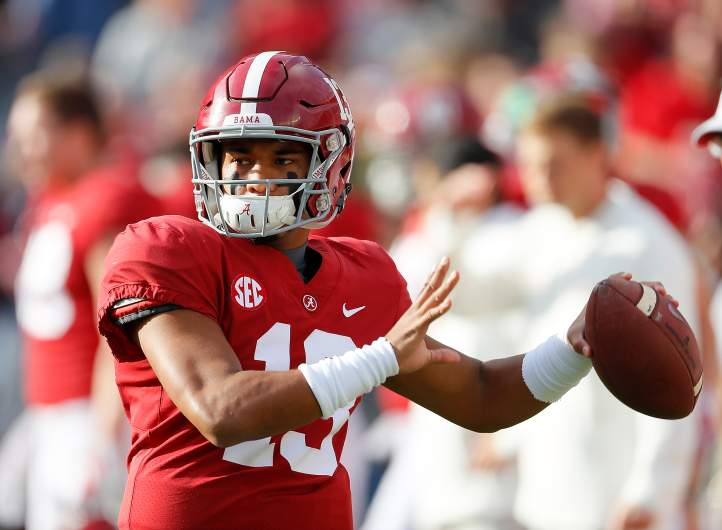
Heisman-favorite Tua Tagovaila was highlighted in a “College Gameday” segment called “How ‘Ohana’ drove Tua Tagovailoa to play at Alabama,” which includes interviews with the Tagovailoa family and details Tua’s journey to becoming a Heisman contender in Alabama.
The segment follows the typical formula: Tua talks about his love for his family, and his parents detail a work ethic that began in his youth (he trained at the beach with his father almost as soon as he could walk). But some details from the interviews have people concerned about the pressure the young quarterback faced growing up under his father’s strict parenting style.
Tagovailoa’s Father Forced Him to be a Lefty

GetttyTua Tagovailoa’s left-handed throwing gives him an edge in-game.
Growing up in Hawai’i, Galu Tagovailoa would take his son to the nearby beaches often. These weren’t your regular beach days, though. As his mother reveals in the segment, “Tua walked right at one. I think [at] two years, he had him running in the sand.”
She adds, somewhat gravely, “Going to the beach with dad was different than going to the beach with mom.”
The idea of a two-year-old going to the beach to train is a jarring image for most, and Galu says that they would also work on Tua’s throwing from an early age.
People’s biggest issue with this? Tua is not naturally a lefty; his father made him into one.
“We would go to the beach to train. We would do a lot of throwing,” Galu says in the interview. Attention switches to Tua, who comments, “I’m right-dominant. I write with my right, I eat with my right. My dad switched me to throw with my left hand.”
While teaching his son to throw lefty was a strategic move that has certainly paid off, the fact that the elder Tagovailoa was already thinking of ways to mold his son into a world-class football player at such a young age is what concerned viewers most. It brings to mind the “sports parent” stereotype. Horror stories about parents who want their kids to go pro at any cost, often forcing too much on them, too early.
“Because I”m the only lefty in the family,” Galu continues proudly, “I thought, ‘Okay. I’m gonna make my son a lefty.'”
ESPN’s Treatment of Tagovailoa Beatings Raises Concern
As easygoing music flows in the background, the tone of the segment quickly changes when Tua admits that his father would beat him after poor performances in high school.
“It had to do with a lot of pressure. If I don’t perform well–perform the way I’m supposed to–I’m gonna get it after,” Tua says as the now-incongruent music continues to play in the background. “Just know that the belt was involved and other things were involved as well. And it’s almost the same with school. If I don’t get this grade, if I don’t get this grade, I’m gonna have to suffer the consequences.”
The segment continues seamlessly, treating the revelation as something that’s supposed to be inspiring, and some consider it a tone-deaf move by ESPN.
The segment then cuts back to Galu, who chuckles, “Two things in the Tagovailoa home: Your faith, and your discipline. It’s simple.” Diane Tagovailoa, Tua’s mother, sighs as she explains her husband’s comments. “He means the bible, and the belt.”
A Lot of People Weren’t Inspired by the Eyebrow-Raising Segment
Though the segment was presented as a heartwarming story of how a family supported their son, the fact that Mr. Tagovailoa used beatings, childhood conditioning, and an authoritarian parenting style (Galu chose Alabama as his son’s college destination, not Tua) left viewers confused and concerned.
Some people were shocked about the casual way that the segment treated the information, and couldn’t believe it wasn’t getting more attention:
Others couldn’t believe that anyone okayed this as a “heartwarming” story:
The segment brings to mind other issues often seen in the football community, such as problems with abuse in the NFL:
As stated before, Galu Tagovailoa’s methods also bring to mind some of the worst ways to parent an athlete. Such methods often lead to an eventual snap, though to be fair, Tua seems okay:
It’s Not Abuse, it’s Culture
Defenders of the segment have called people out for misunderstanding the message the family was attempting to convey and pointed out the fact that a tough-love parenting style is common in Samoan families.
In the family’s defense, Tua does seem to have a great head on his shoulders. He’s calm, he’s confident, he speaks of his family with a respect that doesn’t seem based in fear, and he’s an incredible quarterback. While some see his family packing up and moving to Alabama as a means of keeping tabs on him, others have insisted that it truly is a showing of familial closeness and that there’s nothing concerning about any of it at all.
Unless you’re a member of the Tagovailoa family, there’s no way to know. But the manner in which ESPN presented this segment has gotten people talking about where to draw the line when it comes to raising a gifted athlete.

Comments
Tua Tagovailoa Segment Ignites Conversation About Child Abuse